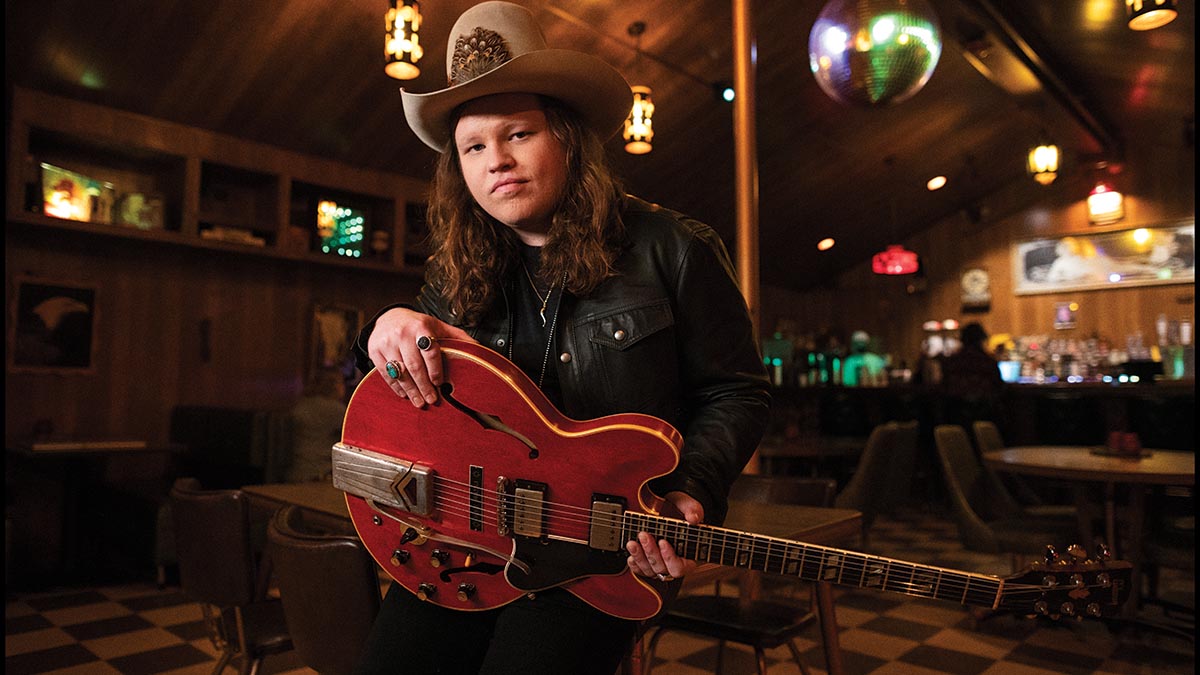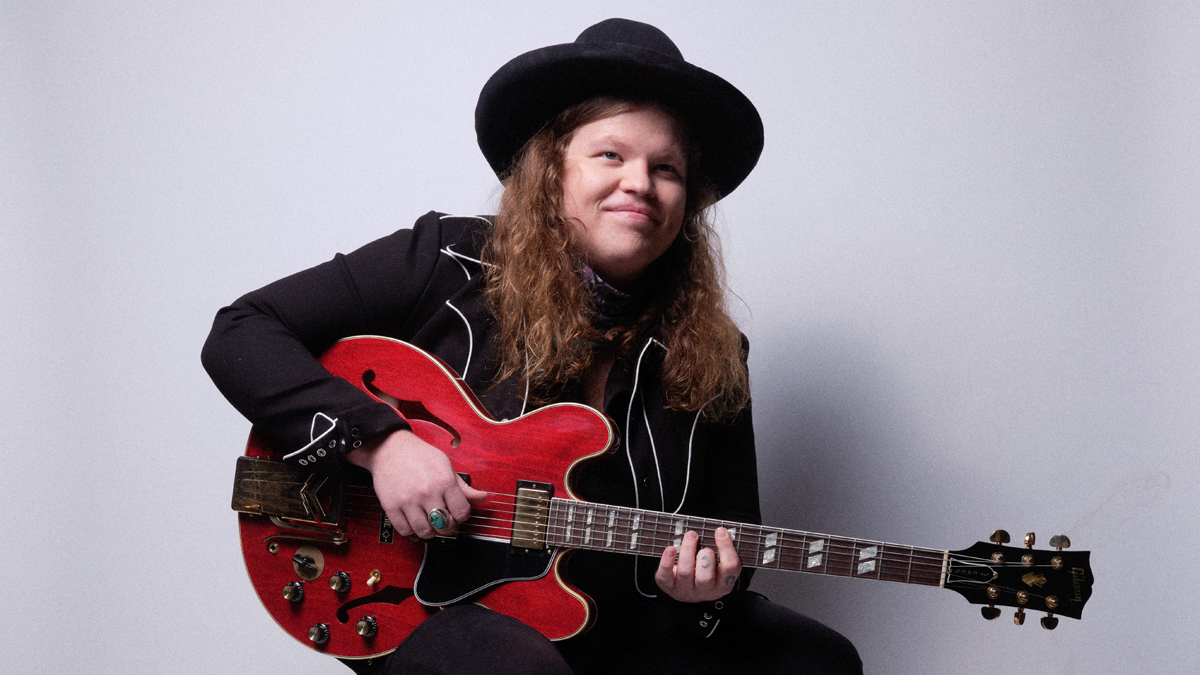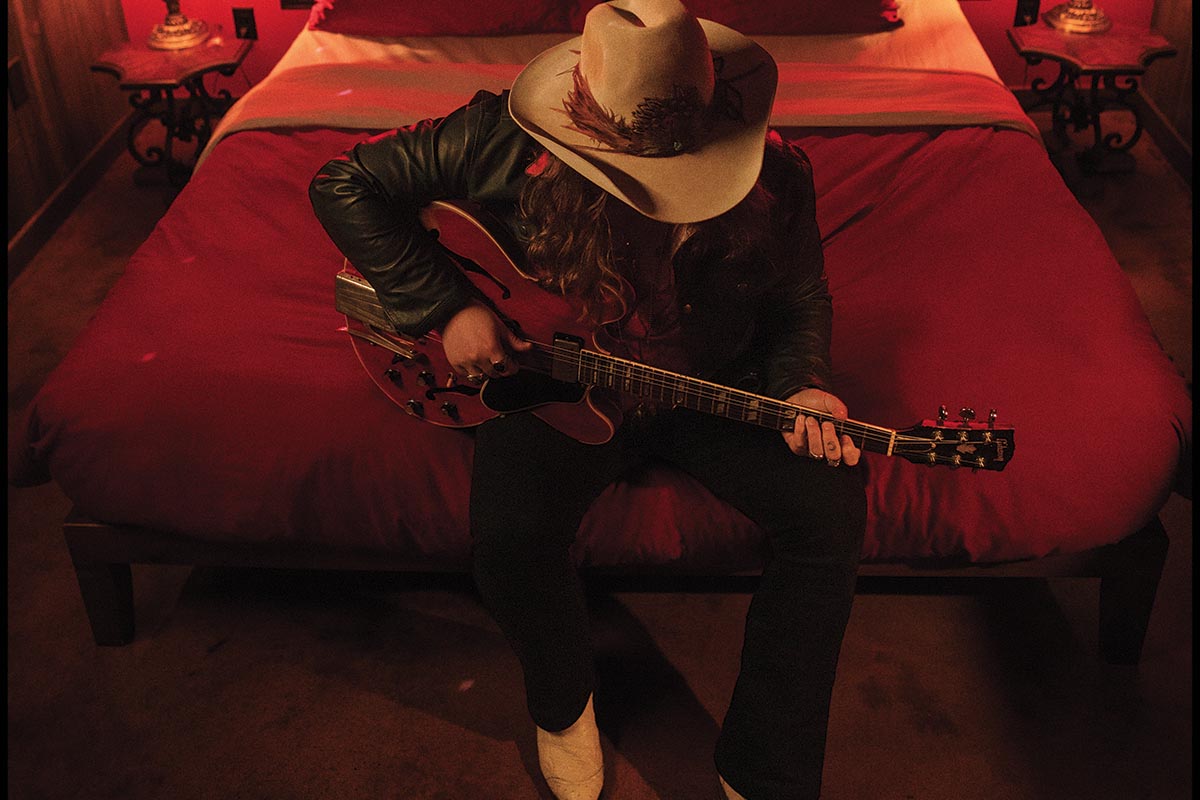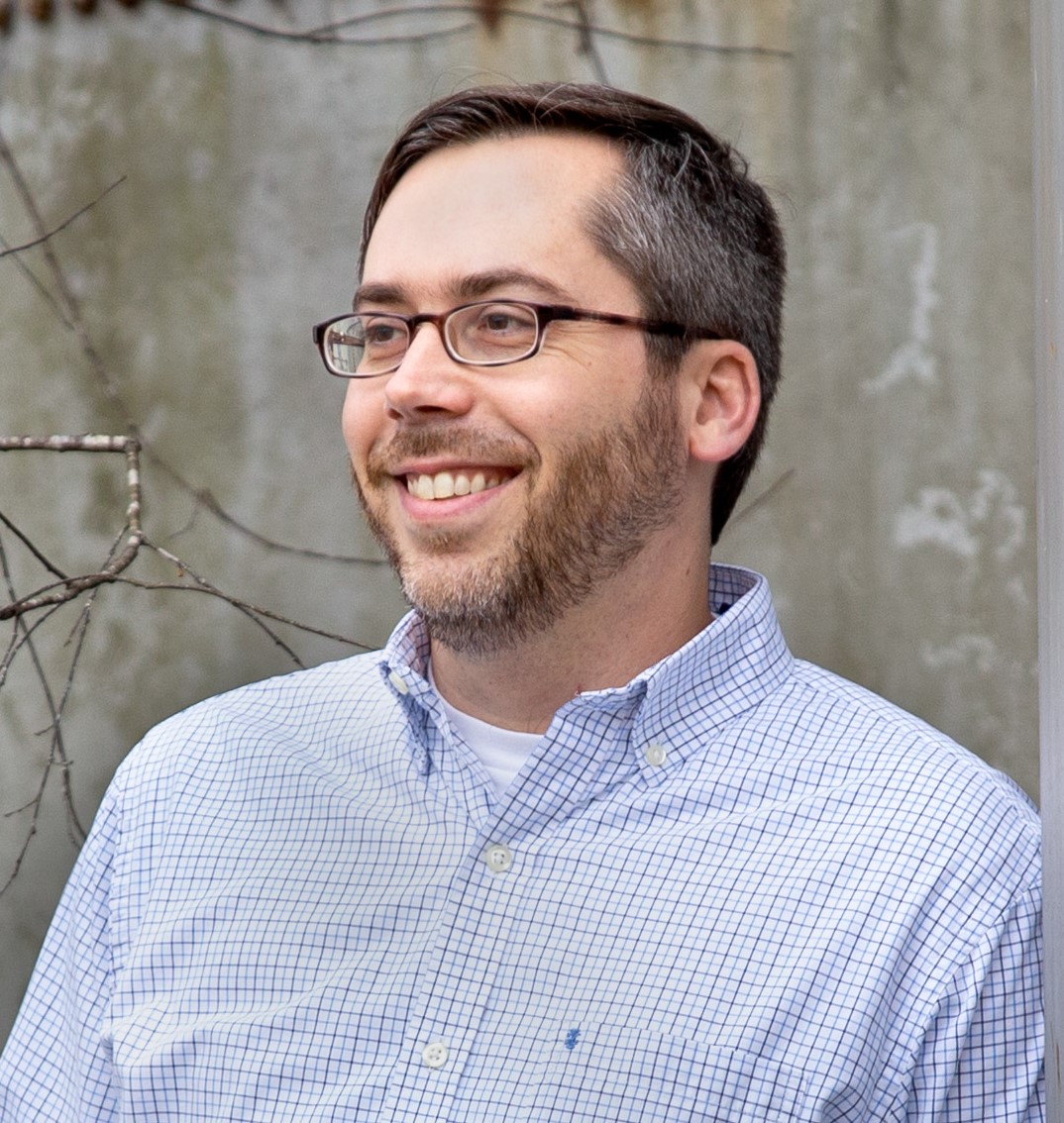Marcus King: “I wanted to take it back to Cream at Madison Square Garden, just really crank the amps and do a rock ’n’ roll record”
Casting his bid for arena-rock glory on new album Young Blood, Marcus King cranked up the volume and stepped on the fuzz for a live and dangerous sound

Arenas don’t rattle like they used to. Or, at least that’s the premise guitar phenom Marcus King took into Nashville’s Easy Eye Sound when he cut Young Blood, his second solo album. “I wanted to take it back to Cream at Madison Square Garden,” the 26-year-old tells Guitar World. “Just really crank the amps and do a rock ’n’ roll record.”
In an era when quiet stages and in-ear monitors are making rock music safer than ever, there’s something to be said for diming a guitar amp and letting the chips fall where they may. And in 2021, King was ready for a new beginning.
On the heels of the Grammy-nominated El Dorado, his 2020 paean to '70s soul music, King found himself at the end of a bad relationship. As his personal life spiraled out of control, he was able to rein it back, thanks in part to the musical journey that led to Young Blood.
King penned the thundering riffs at his Tennessee home on a 1961 Harmony Sovereign as the fog of his decadent descent cleared, assembling the bones of the hardest-rocking songs of his career. Regrouping with Dan Auerbach of the Black Keys, who produced El Dorado, the pair began to work out the arrangements – even bringing in Desmond Child, the patron saint of arena rock for his work with Bon Jovi, Aerosmith and Kiss, for the grooving Blood on the Tracks.
“That was a real good example of a song that didn’t exist at all until we all left that room after two days,” King says. “That song took the longest to write, ’cause Desmond is very particular.” His favorite part, he jokes, is getting the word “amphetamines” into a song that has Child’s name on it.
Recorded live over six days with only a handful of overdubs, Young Blood bursts with explosive riffs tempered into form by Auerbach’s warm, analog production. It’s not tough to pick out influences like Free on Dark Cloud, or subtle nods to Creedence Clearwater Revival’s Suzie Q on Rescue Me and Blood on the Tracks, or an homage to greasy Billy Gibbons-style riffing throughout the album.
The most Young Blood has in common with the Allmans-meets-Americana of his 2018 set Carolina Confessions, though – recorded with his six-piece Marcus King Band, who are still his live band – is King’s sense of melody and commitment to crafting organic soundscapes.
Get The Pick Newsletter
All the latest guitar news, interviews, lessons, reviews, deals and more, direct to your inbox!
We caught up with King to chat about the journey that led to him kicking out the jams on Young Blood.

This album explores your harder rocking side. What was your North Star in the studio?
“We wanted to put the arena back in rock ’n’ roll, and vice versa. When I go see a group in an arena, I want to feel the bass and I want to hear the guitar amps, but a lot of times they’re just letting the front of house [sound system] put the work in. Dan [Auerbach] really liked my vision, and I knew he was the right guy to produce it, ‘cause he still does that, speaking of arena bands.
“But when we got in the studio to work on it, I had fallen into this hole that I was in and was kind of struggling a little bit with some various extracurricular substances and what have you, so the music lent itself to that and [expressing] the most organic version of me. So, it was a natural thing.”
Do you have a setup at your house where you can crank your amps to get that arena vibe?
“I’ve got a home studio, but I do a lot of my writing on an acoustic guitar, a ’61 Harmony Sovereign. I wrote the whole record on that guitar. I picked it up at my friend’s place down in Clarksville [Tennessee], Mom and Dad’s music store, a really great spot. And I was just kind of down there hanging out, and I fell in love with this guitar.
My weapon of choice before that was always my ’61 0-18 Martin. That’s the first guitar I bought with gig money when I was about 15, and I wrote every record on that guitar
“I think the significance of that guitar was [that] I was in a really controlling relationship and that’s the first piece of gear at all, let alone a guitar, I bought after that relationship. It was a representation of my freedom. Everybody that leaves a relationship, they start off with a sense of freedom. And mine obviously went real far south, but that was a pretty liberating feeling when I bought that guitar.”
Have you always written on an acoustic?
“Yeah. My weapon of choice before that was always my ’61 0-18 Martin. That’s the first guitar I bought with gig money when I was about 15, and I wrote every record on that guitar.”
Did you have a particular regimen when you were writing? Did you try to just absorb what the great '70s power trios did so well?
“Yeah, I think ‘absorb’ is the key phrase. I was living really hard but one thing I was doing was listening to a lot of Cream, a lot of ZZ Top, a whole lot of Free and Sabbath and Zeppelin. I listened to any big, trio-sounding group I could get my hands on and just blared it at my place by the lake.”
I can hear Free in the intro to Dark Cloud, and bands like Creedence in some of the playing, as well.
“Yeah, that’s the most unintentional one on the record, as far as inspiration. When we started cutting Blood on the Tracks, I was like, ‘Hell, man, this has kind of a swampy feel. It’s getting kind of humid.’ So, we chased that feeling and put proper percussion on it, and it happened really unintentionally. But that’s not a bad group to model yourself after.”
Oh man, the worst thing I could do, for my mind, is to plan a solo. I’ve just got to do it right on the fly
Did you change the way you play to fit the trio format?
“No, not necessarily; that’s how I came up, really. My first groups that I started when I was 13 and 14, and all the bar gigs I did, were in that format, so I just went back to this earlier version of myself. The whole idea of the record was to put a final chapter on this [era] of my life and close that book. So it’s really the most natural way for me to do it.”
Even though you tracked live, did you work out your solos in advance?
“Oh man, the worst thing I could do, for my mind, is to plan a solo. I’ve just got to do it right on the fly. If there’s ever a situation where I like an idea from the last take, I’ll use that as a blueprint, but I just play from the heart. That’s really the only way I know how to do it, and that’s pretty much how the whole record was.”
You worked with Dan Auerbach on El Dorado, but the results are very different on Young Blood. What was different in the way you approached the recording this time?
“As opposed to El Dorado, we cut this one all in the same room and cut the vocals and guitars live. I mean, there were some vocal overdubs that had to be done like with any record, but for the most part, what you’re hearing is a live take.
"It was very different from how we did El Dorado. Dan has a way of pulling out the sound you’re going for, and on El Dorado he wanted to showcase the balladeer side of me. On this record we wanted to really get the lead out, so that’s what we did.”
How did you get the thick guitar tones?
“I used pretty much the same gear the whole time. I used a ’59 Les Paul – you can’t go wrong there. It’s a really special one that I was actually looking at buying from Carter [Vintage Guitars in Nashville], and Dan ended up getting it. And I ended up buying my first house. [Laughs]
“But the amp I used was this old Gibson amp my dad got. I don’t know what model it is; it’s got tremolo and it’s really a funky little amp. A lot of vibe. It’s been taken out of the original chassis and put in this large, plywood, homemade chassis. It was just a box, pretty much, with the grille on it and the three chicken knobs at the top.
“I had to put a new power cord on it, ’cause I used to call it Old Sparky because of the exposed wires. And it’s still pretty dangerous, but in a good way. I used that amp on everything – it would be that, in stereo, with either a reverb unit or an old Supro 8030. It really just depended on the tune. And pretty much that Les Paul or my [Gibson ES-]345 the whole time.”

Why that particular amp?
“Man, it’s just a low-output amp, but I don’t know why I picked that one, really. I just have these feelings in my heart sometimes and I just follow ‘em, I don’t question. I just obey orders, especially when they’re from the heart.”
This is a fuzz-heavy album. Did any particular pedals do the heavy lifting?
“Really just two. A buddy of mine out of Maine builds these wonderful [Tru-Fi] fuzz pedals. He kind of reverse-engineers some of our favorites, and he made me one called the Colordriver that I really like. We also used a Tone Bender, and Dan gifted that to me after the record was done.”
What are some characteristics you love the most that you were able to pull out for this record?
“When we play live we get into some avant-garde territory, and anytime I can use a guitar to explore the emotions in my mind, with my manic-depressive ass, anytime I can use the guitar to get that point across is a good day. Tru-Fi, his first pedals, really allowed me to get that. It’s hard to explain. It’s the aggression I want and being able to put pain into a note, I’m able to do it with that pedal.”
Five records into your career, how do you keep your approach fresh?
“Really it’s about being around other great players. Like, Drew Smithers [formerly of Bishop Gunn] joined my group – he’s always been one of my favorite players, and we borrow things from each other musically all the time. It’s hard not to absorb it if it’s something that you really dig.
“I’m very seldom sitting down with my guitar and intentionally trying to learn something note-for-note. I get a lot of influence, phrasing-wise, mostly from vocalists. My favorites are Aretha Franklin and Ray Charles. That’s really where I find new ideas; playing off of other people and just trying to absorb as much as I can from whatever I can.”
- Young Blood is out now via American Recordings.
Jim Beaugez has written about music for Rolling Stone, Smithsonian, Guitar World, Guitar Player and many other publications. He created My Life in Five Riffs, a multimedia documentary series for Guitar Player that traces contemporary artists back to their sources of inspiration, and previously spent a decade in the musical instruments industry.
“A virtuoso beyond virtuosos”: Matteo Mancuso has become one of the hottest guitar talents on the planet – now he’s finally announced his first headline US tour
“His songs are timeless, you can’t tell if they were written in the 1400s or now”: Michael Hurley, guitarist and singer/songwriter known as the ‘Godfather of freak folk,’ dies at 83










